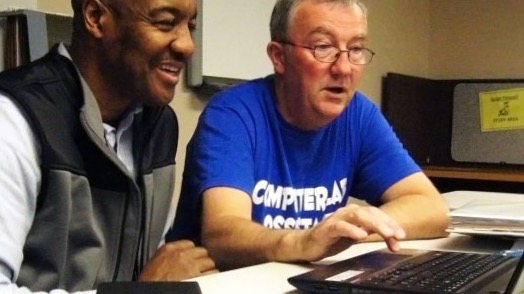
Our Adult Learning Beacon Project shines a light on communities using technology in ambitious and innovative ways to support adult learners.
Our Beacons’ stories of how they address common challenges show what it takes to develop and scale effective adult learning across multiple partnerships. Through their work at the leading edge of integrating technology into adult learning, we can understand and amplify new models and practices.
Select the initiatives you would like to see.
Select options to filter results.
Innovation:
Designing soft skills and workforce development digital modules for the needs of underserved populations
Access Green, LLC, is an energy conservation firm. As part of their mission, Access Green focuses on hiring from underserved populations and supporting these employees for careers in green construction through education, training, and mentoring.
Innovation:
Developing a blended learning curriculum to provide low-skilled adults educational opportunities at their worksites
Building Skills Partnership (BSP) develops partnerships among janitorial contractors; corporations such as Google, Facebook, and Cisco; and the Service Employees International Union to support over 2,500 low-wage workers a year with blended learning.
Innovation:
Serving patrons’ specific needs by developing custom ed-tech products and services
Chicago Public Library (CPL) strives to find new ways to educate its patrons to help them improve their lives. They offer a host of classes that integrate technology, ranging from basic computing up to intermediate HTML and CSS courses.
Innovation:
Partnering with a developer to create a mobile ELL product designed for adult learners’ busy lives
Community Action, Inc. of Central Texas (CAI) is a community-based nonprofit organization that integrates technology into all of its programs: adult literacy education, GED preparation, and ELL programs.
Innovation: Joining forces to leverage ed-tech buying power and resources in support of adult learners
The Florida Adult and Technical Distance Education Consortium (FATDEC) is a group of public schools, school districts, and community colleges who work together to leverage their buying power to provide digital solutions and professional development.
Innovation: Leveraging the role and reach of public TV on behalf of adult learners
Kentucky Educational Television (KET) is a PBS member station widely recognized as a leader in developing digital learning opportunities for adult basic skills and workplace education.
Innovation:
Offering ESL, computer skills, and high school equivalency classes at the county jail and in local orchards
The Orleans/Niagara Board of Cooperative Educational Services (O/N BOCES) provides programs for underserved adults, supporting the community by paying equal attention to the academic and social needs of their learners.
Innovation:
Creating myPLACE, a network of hubs including myPLACE online, offering literacy, math, and career skills courses
The Office of Education (OAE) works with over 80 literacy and workforce development programs to help adults with below-basic education levels qualify for jobs, post-secondary training, and education.
Innovation: Transforming English language learning with “flipped” classrooms
The Washington State Board for Community and Technical Colleges’ (SBCTC) Project I-DEA uses digital technology to provide “flipped” classrooms for adult English language learners.
Innovation:
Creating a free lending system for devices and wifi hotspots to provide underserved learners with full access
Rhode Island Family Literacy Initiative (RIFLI) equips adult immigrants with the literacy skills for upward mobility, engaged citizenship, strong families, and lifelong learning through both onsite classes and full access outside of the classroom.
Innovation:
Linking the technology curriculum directly to job opportunities in the local area
At Savannah Technical College (STC), students can earn certificates and diplomas in aircraft structures manufacturing and repair, luxury craft cabinetmaking, and aircraft electrical equipment repair and installation.
Innovation: Developing a virtual learning center to help alleviate the rural isolation
felt by their adult learners
In support of their rural parents, Students and Parents in Cooperative Education Family Literacy Program (SPICE) has pushed the boundaries of technology integration, moving beyond blended learning to developing a virtual learning center.
Innovation: Developing a digital platform that customizes career and postsecondary exploration for Opportunity Youth with support from caring adults
YouthBuild USA, Inc., is an international intermediary for more than 250 community-based YouthBuild programs and schools around the U.S. Each year, approximately 9,000 low-income young people, also known as Opportunity Youth, enroll full-time in YouthBuild programs.